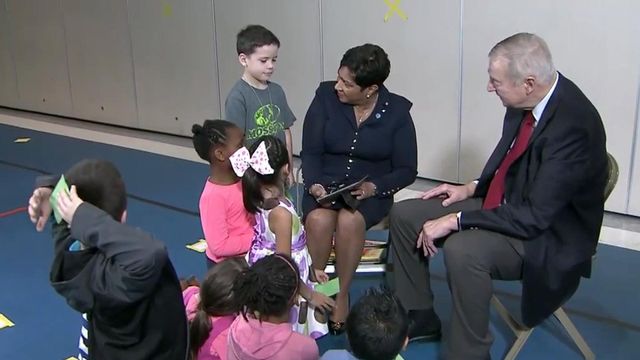NC business leaders tout need to read, seek more early education funding
Several business leaders lobbied North Carolina lawmakers on Thursday for expanded funding for pre-kindergarten and other early childhood education programs.
Posted — Updated"The idea is, if you can't read by the third grade, you're going to be left behind," said Jim Goodnight, founder and chief executive of Cary-based software developer SAS Institute. "As a matter of fact, if you don't have reading proficiency by the end of the third grade, you're four times more likely to drop out of school before you graduate high school."
Goodnight was joined in the lobbying effort by Venessa Harrison, president of AT&T North Carolina; Dale Jenkins, chief executive of Medical Mutual Insurance Co. of North Carolina; Mike Lamach, chief executive of Ingersoll Rand; Tom Nelson, chief executive of National Gypsum Co.; and Jim Whitehurst, chief executive of Red Hat Inc.
According to the Business Roundtable report, which Goodnight spearheaded, the U.S. will have 5 million jobs going unfilled by 2020 because there's aren't enough people qualified to fill them. In North Carolina, two of every three jobs will require postsecondary education or training by 2020.
Developing reading skills early, the report says, helps students become more proficient in technology-based STEM fields, as well as in jobs that require no training beyond high school.
"STEM skills require an awful lot of reading. I mean, that's how you learn different areas in STEM is by reading," Goodnight said. "It's extremely important to be able to read. So, you learn to read by the end of third grade, and then you read to learn after that."
Because only one in three American students demonstrates reading proficiency on national assessments in the fourth and eighth grades – for black, Latino and low-income students, the number is one in five – the report makes the following state policy recommendations:
- Expand access to pre-kindergarten programs
- Offer full-day kindergarten programs to ensure a smooth transition into elementary school
- Routinely assess and track student progress through connected data systems
- Train teachers and principals on how to build literacy skills and engage families as partners in the process
- Require schools to develop intervention programs for students who struggle with reading
- Coordinate pre-K and K-3 efforts
North Carolina adopted its "Read to Achieve" program in 2012, requiring students to pass a battery of reading proficiency tests by the end of the third grade. Those who don't have to attend a six-week summer reading camp or repeat the third grade.
"Our reading grades have slowly improved at third grade, but it's going to take another 50 years at the rate we're improving. We need to find some way to speed it up," Goodnight said.
One way to do that is expand North Carolina Pre-K, he said, noting the state has space for less than half of the 66,000 low-income students who qualify for the added early instruction.
"Education really is the only differentiator that's going to get somebody out of poverty, so we've got to find ways to get more of our low-income students interested in school and try to teach them how to read," he said.
• Credits
Copyright 2024 by Capitol Broadcasting Company. All rights reserved. This material may not be published, broadcast, rewritten or redistributed.





